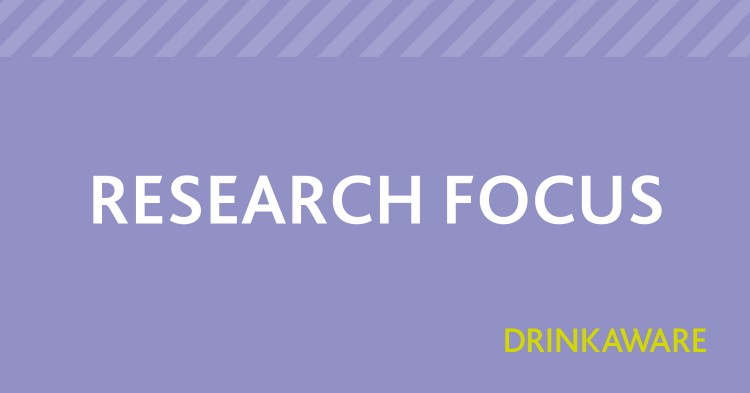We were thrilled to host our 9th Research Briefing event on 30th March 2022 at which Dr Michael Daly, Maynooth University gave the keynote presentation focusing on analysis that he has undertook using data from the Growing Up in Ireland (GUI) study to examine self-control and alcohol consumption during late adolescence and the transition to young adulthood in Ireland. Dr Daly provided the 20+ stakeholders from across a range of disciplines and backgrounds who attended (virtually) with a fascinating and extremely insightful presentation on some of his research that also allowed the opportunity to discuss some of issues further as part of a Q&A with our Research and Impacts Manager, Dr Ann Stokes.
Self-Control
Michael first introduced the audience to what self-control is – a trait that emerges early in life and persists into adolescence and adulthood. It involves the ability to regulate your thoughts, feelings and behaviour often in the service of long-term goals. Examples of low self-control in everyday life include having an extra biscuit or with long-term consequences such as not signing up for a pension. Self-control is studied across a host of different perspectives and disciplines from psychology, economics, neuroscience and criminology. While it is a core element for differences in childhood, it bears implications in later life in areas such as education, pensions, unemployment and abuse of harmful substances. Michael has been working in the area of self-control for a number of years and provided examples of his research as part of his presentation.
The importance of following people over time cannot be underestimated in self-control. This dynamic relationship is what Michael wanted to explore and the GUI data feeds into helping to answer who takes up high-risk drinking. And if in that high-risk category and you want to try break that cycle, does self-control help get you out of that situation as well? Rich data has been collected for over a decade with over 8,000 children initially surveyed at age 8/9 and with most recent alcohol and self-control data available at age 17 and 20 from 4,643 participants. One of the most popular measures of self-control is the Brief Self-Control Scale (Tangney et al 2004) and this was used in the GUI study, while the outcome used was the Alcohol Use Disorders Identification Test (AUDIT). At age 20, 13% reported drinking in the ‘high-risk groups’.
Similarly in using the AUDIT-C ( a modified version of the 10 question AUDIT instrument with 3 questions) in our 2020 Barometer and again in 2021, we were able to identify the percentage of adult drinkers in Ireland who are in the cohort of potentially at risk – as these individuals are not being defined as ‘risky drinking’ but may be on the cusp of potentially doing so. This is important because at the same time, we previously found that many adults are unaware of how much they are actually drinking when they are doing so at home, and so they may indeed be drinking unintentionally more.
Growing Up In Ireland
From Michaels analysis of GUI data, low self-control at 17 predicts the onset of high risk drinking at 20. When AUDIT scores were examined at age 20, about 10% of variance is explained by low self-control. Higher household income, more extraversion and drinking at 17 were all positively predictive as well as parental drinking. At the same time, high levels of self-control were also found to predict a reduced onset of high-risk drinking and a reduction in high-risk drinking between the ages of 17 and 20 years across all social backgrounds and contexts/drinking occasions too (I.e. who drinking with, where and why drinking is not a key factor).
As highlighted above, examination of GUI data also identified exposure to parental drinking and the association with self-control. Michael explained that it may become more difficult to ‘exit’ drinking when social norms around drinking are in place and when drink is in the home, hence it may be easier to ‘exit’ if parents don’t buy it so much. We are currently undertaking a qualitative piece of research with B&A looking specifically at parental drinking experiences and look forward to sharing findings of this later this year.
Societal-Based Approach
Michael also spoke about a recent switch away from individual to societal-based approaches in that systematic changes can bring larger overall benefits because it is scaled up across the population, to this Michael referred to the work of George Loewenstein. This entails the idea of what can be done within the environment to remove the need for self-control in some way. For example, this is evident with pensions and auto-enrollment – I don’t need to have self-control because the money comes out of my account every month! This approach focuses not on trying to train self-control but how self-control may be supported in some way. This has important implications for our own work in encouraging Irish adults to not feel alone but part of a growing movement of important positive trends. For instance, in 2021 37% of Irish adults reported making small positive changes to their drinking habits in the past 12 months and 30% reported that they would like to drink less, both representing increases on 2020 Barometer figures. 1 in 3 adults claim that they will continue to decrease their consumption in 2021 as 35% indicate they have decreased the amount of drinks they have had and 33% have decreased the frequency of drinks since COVID-19.
We look forward to facilitating further debate on alcohol and behavioural change by hosting our next research briefing in Summer 2022 and in so doing, contribute to sharing learnings and knowledge. If you would like to be added to our invite list, please email research@drinkaware.ie We also encourage you to look at the section dedicated to our Research Briefing Series on our website to which any outputs from this and all previous events are added and freely accessible.


